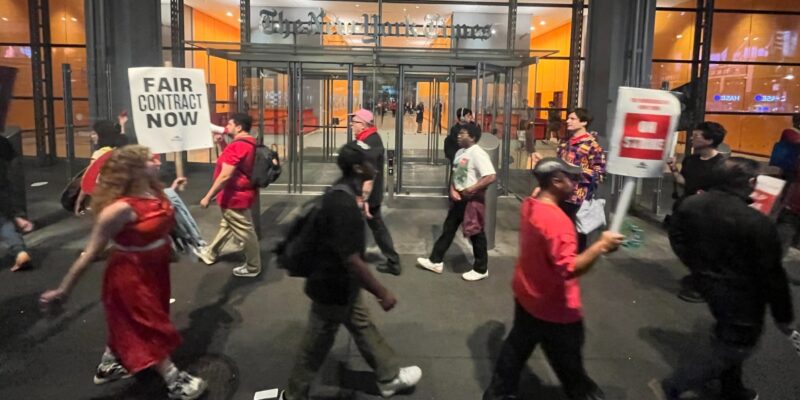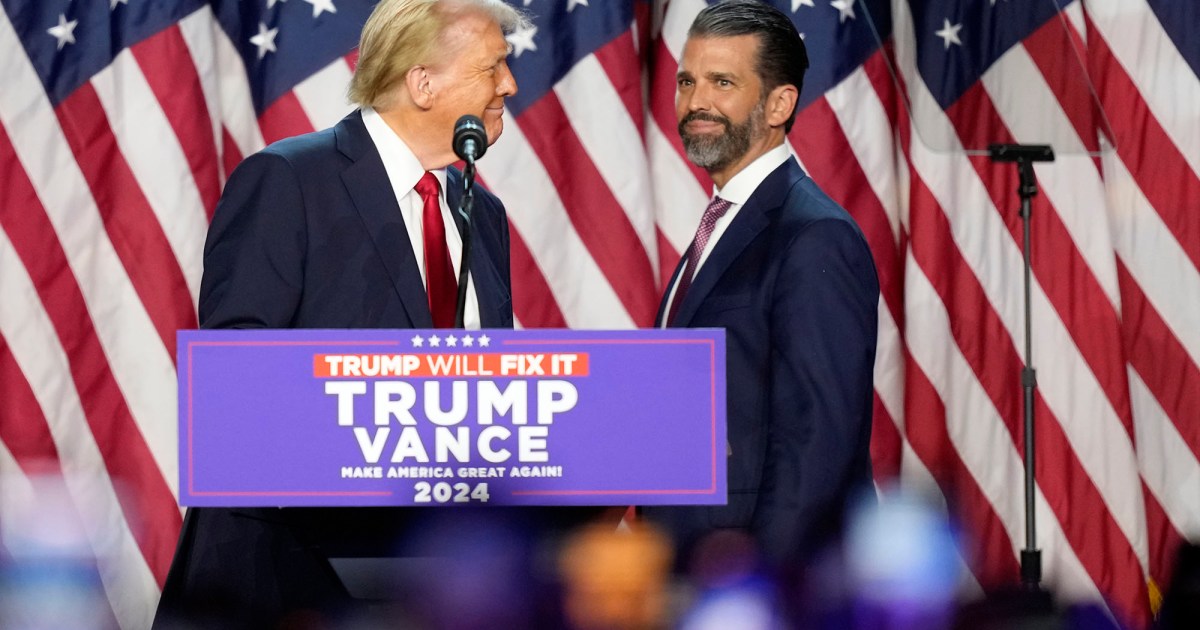
As the sun set over the New York Times building on election night, the Times Tech Guild—the union of workers that power the infrastructure for the company’s news, games, and cooking—closed out their second day on the picket line. Their strike, an attempt to push for a deal they’ve negotiated for over two years, might bring down tonight one of America’s most beloved and beloathed election-night prognosticators: the Needle.
As reporter and polls expert Nate Cohn explained on X, the tech team “built and maintain the infrastructure that feeds [the Needle] data and lets [the Times] publish [it] on the internet.” As of the time of publication, the Needle is up. But it’s unclear if without the guild’s work it will last.
The Tech Guild wants pay equity, remote work protections, and—top of many minds on Tuesday night—protection from being arbitrarily fired, known as “just cause.”
The 173-year-old Times has over the past several years transformed into something more like a tech company with the news as a key, but not singular, component. Its games and cooking apps drive subscriptions; it has expanded into audio and sports. With that transformation has come a change in how workers organize at the company. Now, alongside their newspaper and advertising workers’ unions, the paper hosts one of the largest tech unions in the country.
Kathy Zhang, unit chair for the New York Times Tech Guild, has had “probably hundreds of conversations” with her fellow workers leading up to this moment. I asked her about the picket line, the Needle, and why workers are striking.
What would you normally be doing on election day if you weren’t on the picket line?
I am a senior analytics manager on the audience team at the New York Times, which means that I pull data around traffic trends, and I look at how people are listening to audio and engaging with our coverage.
This will be my third presidential election here. I’ve been at the Times for nine years. In 2017, on January 20th, inauguration day, I was the person who stayed up past 1 a.m. waiting for our data to come through to let our editors know what election traffic looked like. Election day is one day, but election season is a long time, and we spend a long time prepping for it. It’s unfortunate the management let it drag out this far.
I know you all have been saying this could happen for some time, right?
We have been bargaining for almost two and a half years. We started bargaining in July of 2022. It was September 10 when we passed a strike authorization vote with 95 percent support. We told management the very next day, we gave them two months in advance. We were in bargaining all last week, but on Sunday night, management decided to walk away from the table. So the ball is literally in their court.
Online, I’ve seen right-wing media focusing in on some unusual concerns they claim you’re bargaining over stuff, like pet bereavement leave, trigger warnings on political topics, that kind of thing.
The most important issues that are unresolved right now are just cause—meaning that we can’t be fired for no reason whatsoever—and flexible work, so that people who have caretaking responsibilities or live hundreds of miles away aren’t forced to come into the office. We’re a unit in which, you know, our members see a lot of inequity in how we’re paid. We want to be paid fairly.
Management, instead of talking about the actual issues at play, has been seeding talking points to right-wing media. It’s actually pretty depressing coming from a newspaper that’s supposed to care about independent journalism; they’re putting misleading talking points out there.
I saw a clip on Fox News that said we were looking for job security for illegals. Now, I’ve spent a lot of time working on the visas and immigration proposals that we have on the table. I don’t know what job security for illegals means, because it’s literally about people with visas, right? We care about people getting notice about whether they’re going to get their visas sponsored.
I myself am an immigrant, I am a naturalized citizen, and I care about democracy—that’s why I’m out here in a union! It was a complete mischaracterization of our proposal. It brought up stuff that was maybe on the table two years ago, for maybe seven minutes, and hasn’t been talked about since. I think it’s really telling that the company would rather talk about things they think make us look like we are being unreasonable, rather than talk about the fact that this company has authorized $400 million in stock buybacks, which is money that goes directly into shareholders’ pockets, not to workers.
It doesn’t do anything other than make rich people richer, and they’d rather threaten election night coverage than come to a fair deal with their workers.
If this continues, how is the strike going to affect coverage during and beyond election night?
There are so many interconnected systems that power what we work on, I couldn’t even tell you all the things that could go wrong or could maybe not go wrong. And there are systems that readers aren’t gonna see that will cause a lot of problems for us.
But we have a lot of support from our colleagues in the newsroom and in advertising. They’ve written letters to management telling them that they need us. Our newsroom colleagues are the people who supplied our lunch today—some of them are on the picket line right now in their free time before their shift starts or after they’ve already worked a whole day.
This is the biggest tech-worker strike that I’m aware of in American history. What makes you all different from other tech unions? What’s helped you get this far?
We are the largest “high-tech” union in the country with bargaining rights, but we had a lot of support and solidarity from other tech workers who have been unionized.
I think part of it is, that the New York Times is a newspaper company, but what other newspaper has six or seven hundred tech workers in the company? Sometimes, power comes down to the sheer number of people that you have. We have hundreds of people, and that’s hard to organize! But it also means that when people are standing together in solidarity, when we are out here fighting, we know that we can get through this.
So, right now we’re fighting to make sure that we have more pay equity. We’re fighting to make sure that people just don’t get fired for no reason. That’s really all we’re fighting for.
One of the most amazing things that I’ve seen is people that I knew voted against unionization and voted against the strike authorization vote, are on the picket line today. Because when it comes down to it, which side are you on, right?
This interview has been edited for length and clarity.















